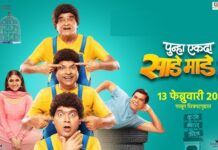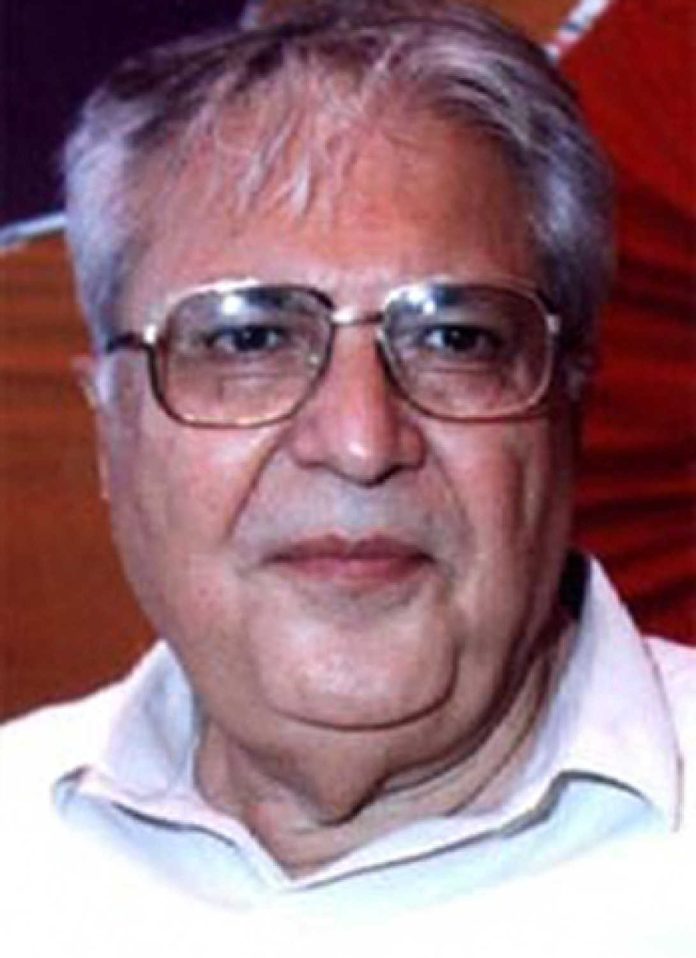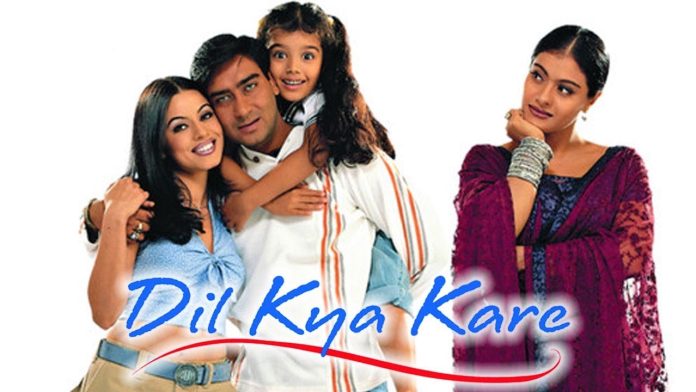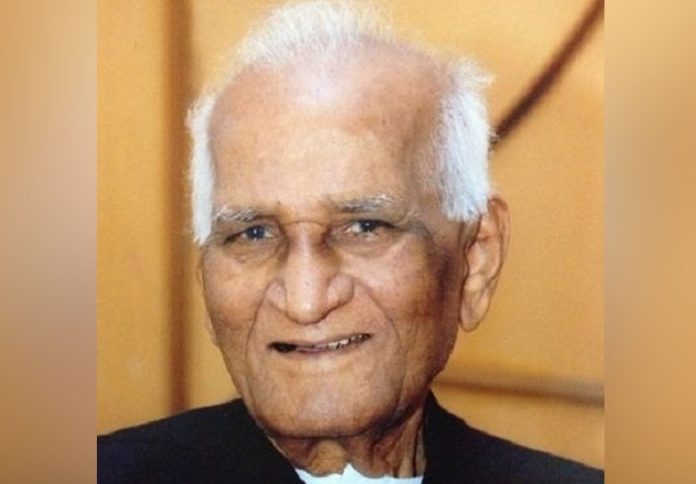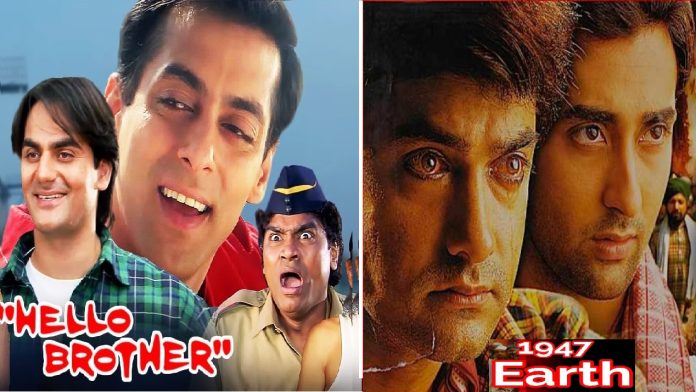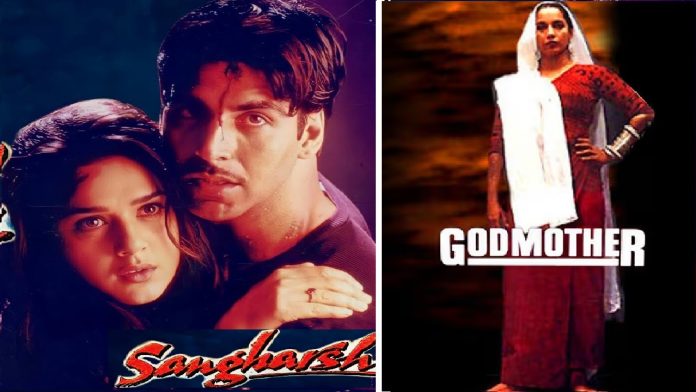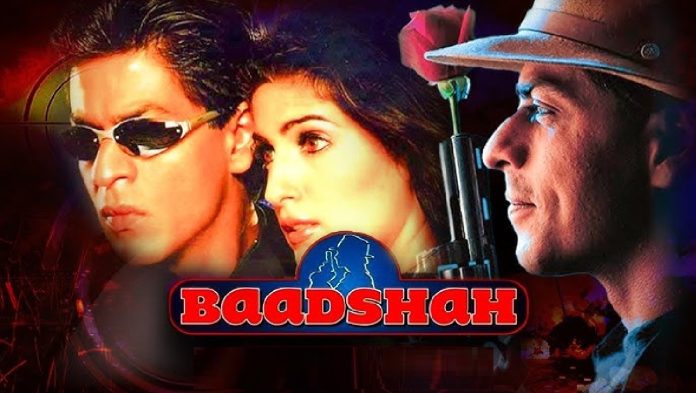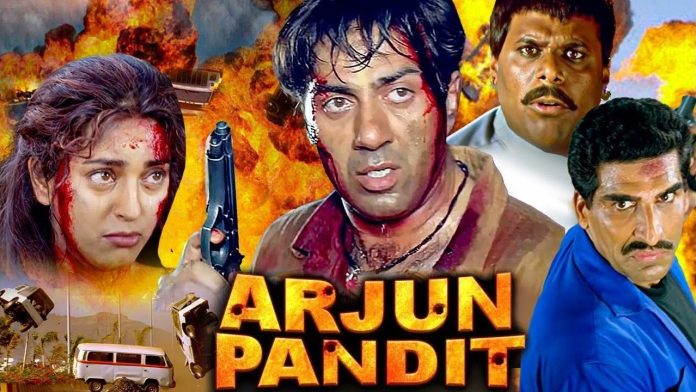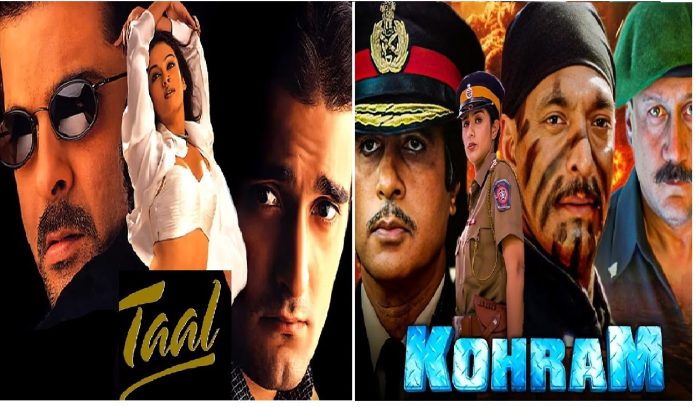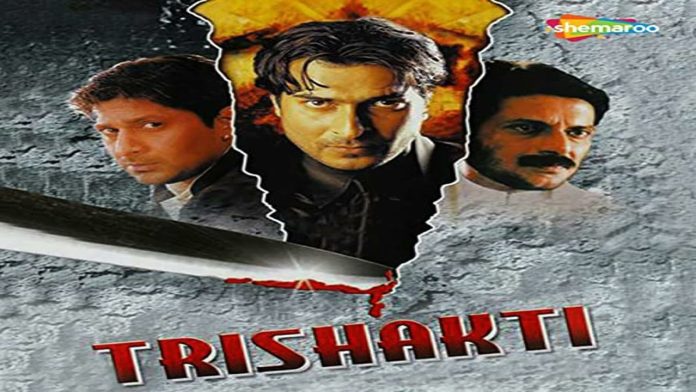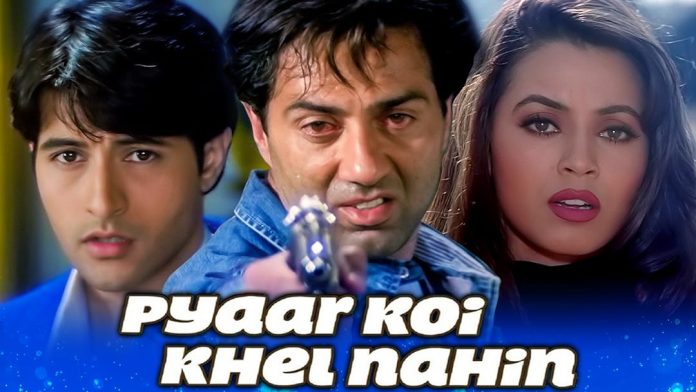DIL KYA KARE
Devgan Arts’ Dil Kya Kare (UA) is a love triangle. A man, his beautiful wife and their little daughter make a happy family until a girl comes into their lives. She is the real mother of the couple’s daughter, the couple having adopted the child from an orphanage. The father of the child is none other than the man himself who has had sex with the girl in a very brief chance meeting with her in a train. All hell breaks loose first in his life and then in the life of his wife when the girl begins to stay in the couple’s house. How the wife reconciles herself to the fact that her husband, before their marriage, has fathered a child and how their marriage is saved forms the climax of the film.
An unusual story (Prakash Jha) has been marred by a screenplay (Vivek Apte and Mangesh Kulkarni) that abounds in flaws. Too many unusual things happen with the same persons and although that may be a coincidence, the viewer starts questioning the coincidences because they involve the same persons all the time and they aren’t properly handled. If one doesn’t question how the man and the girl thought of having sex in the train, the question that definitely comes to mind is: after doing so, why does the girl leave the train without so much as even finding out the man’s name, address or telephone number? The question is sought to be answered by the girl who says that she was too scared to get “no” for an answer from the man on the point of accepting her. But if she was scared about a “no”, did she get “yes” by just leaving the guy with whom she had slept? Further, the girl tries to show her selflessness by repeatedly saying that she felt fulfilled merely by bearing the man’s child and did not desire to now wreck his family life. While the desire to not ruin his family life is understandable, what isn’t is her claim of having felt fulfilled. It almost is akin to equating lust with fulfilment or, in other words, glorifying pre-marital sex. Obviously, such glorification doesn’t work with the Indian audience. Then, the guy’s wife is shown as being so hyper about this mysterious woman (who later turns out to be the child’s actual mother) who gives expensive gifts to the child. Such hyper reaction (calling her names) doesn’t seem appropriate especially when, instead of kidnapping the child, as feared, the mysterious woman actually drops her home from her school. When, after this incident, the wife asks her husband why this mysterious woman is bent upon breaking the peace of their home, it unintentionally gives the story out. Where is she breaking the peace when all she is doing is showering a lot of love on the kid? Again, when the mysterious woman emerges on the scene and tells the man’s wife that she is the child’s real mother, the first question of the wife to the woman should have been about why she had left the child in the orphanage. But that point is not discussed by the otherwise hyper wife. Once the woman reveals her story (without revealing the name of her partner in the train), the wife has the audacity to tell a close boyfriend of theirs to get married to the woman without bothering to check whether the boy is interested in making an unwed mother his life-partner. The writer may call the wife modern in her thinking but he again forgets that the film has to cater to Indian tastes. And then, where does the modernity of the wife go when she learns of her husband’s affair with the woman? Why does she throw a tantrum, especially since the affair took place before he was even married to her. There is no justification for showing the friend so keen on a divorce between the husband and wife after the tension over the other woman. Yet another defect is that the man is not shown feeling guilty about his train episode until the girl emerges on the scene. Does it mean that he feels guilty only because the encounter resulted in the girl giving birth to a baby? The hero doesn’t appear like a hero of a Hindi film because of this. The other woman also sometimes begins to look vampish because of the casual way in which she views sex. Another shock comes when, after being responsible for breaking the man’s family, she spends a night in his house while the wife is away! The climax, in which she pleads to have her child back, looks out-of-place. So does the repeated postponement of her departure.
On the plus side are the extraordinary performances of all the three lead players. There are some brilliant touches and some cute moments, like the scene in which the child is assumed to be kidnapped, the first encounter of the man and the other woman in his house, the telephone conversations about the train being late by two hours, etc. But unfortunately, they are few and far between.
Ajay Devgan does a splendid job, torn between his wife and the other woman. Not once does the guy go overboard and he handles the complex role with admirable understanding and ease. Kajol, as the other woman, is also excellent. But her characterisation will not find universal acceptance for the simple reason that she walked into the affair without enough justification. Mahima Chaudhry also acts very ably. She is especially brilliant in emotional scenes. Chandrachur Singh does an average job and suffers on account of a weak characterisation. His popping on the scene every time, even at midnight when the couple fights, looks ridiculous. Laxmikant Berde irritates. The couple’s daughter has been given long lines of dialogues which are bound to irritate the viewer. Farida Jalal is fair. Mohan Joshi, Anant Mahadevan, Dinesh Hingoo, Avtar Gill, Rajendra Gupta, Aroon Bakshi, Misha Gautam and the rest provide able support.
Prakash Jha’s direction leaves plenty to be desired. He has made a film that will be difficult for the general Indian viewers to digest. Jatin Lalit’s music score is melodious. The title song and ‘Mainu lagan lagi’ are very well-tuned numbers. A couple of other songs are also appealing. Dialogues (Javed Siddiqi) are appropriate. Camerawork is wonderful.
On the whole, Dil Kya Kare is too much for the normal Indian audience to digest. It will, therefore, entail losses to its distributors.
Released on 24-9-’99 at Novelty and 14 other cinemas of Bombay thru Devgan Entertainment & Software Ltd. Publicity & opening: good (due to partial holiday for Ganpati visarjan). …….Also released all over. Opening was shockingly dull in most places.
LATEST POSITION
Both the releases of this week have opened to discouraging houses.
Virus (dubbed) 1 week Jaipur 1,23,664, dull.
Hello Brother is terrible this week at many places and will entail losses of 25-30 lakh per major circuit. 2nd week Bombay 36,17,471 (55.14%) from 11 cinemas (8 on F.H.); Ahmedabad 3,22,061 from 3 cinemas, Rajkot 94,500 (1 in matinee on F.H.); Pune 13,57,103 from 5 cinemas (1 in matinee), Kolhapur 1,65,690, Solapur 1,69,008 from 2 cinemas (1 in matinee); Delhi 27,16,181 from 13 cinemas (2 on F.H.); Kanpur 2,93,483 from 2 cinemas, Lucknow 4,25,172, Agra 1,35,000, Varanasi 1,63,261, Allahabad 1,49,840 (1st 1,92,300), Bareilly (6 days) 88,535, Hardwar 60,000, total 1,65,000; Rohtak 9,250 (1st 26,260); Calcutta 8,80,931 from 8 cinemas; Nagpur 3,37,706 from 4 cinemas, Jabalpur 2,40,989, Akola 1,16,173, total 3,07,741, Raipur (6 days) 94,658, Bhilai 53,781, Jalgaon (6 days) 1,25,130, Wardha 45,632, 1st week Yavatmal 1,45,413, 2nd week Bilaspur 95,303; Jaipur 3,70,516 from 2 cinemas, 1st week Ajmer (29 shows, gross) 3,17,560, 2nd week Bikaner 1,00,726; Hyderabad (gross) 4,95,783 from 2 cinemas; disastrous in Overseas.
1947 Earth is also poor. 2nd week Bombay 18,82,647 (57.85%) from 7 cinemas (4 on F.H.); Ahmedabad 1,02,256 (1 unrecd.); Pune 4,01,916 from 4 cinemas (1 in matinee), Solapur (matinee) 34,537; Delhi 18,54,083 from 5 cinemas; Kanpur 40,108, Lucknow 1,48,800, Agra 59,438 (1st 99,834), Allahabad 36,315, Bareilly 19,267; Calcutta 1,75,686; Nagpur 98,908, 1st week Raipur (gross) 89,587; 2nd week Indore 72,000, Bhopal 63,000; Jaipur 1,60,892, 1st week Bikaner 1,07,790; 2nd week Hyderabad (gross) 4,39,771 from 3 cinemas (1 in noon).
Sangharsh 3rd week Bombay 6,63,762 (43.16%) from 3 cinemas (4 on F.H.); Ahmedabad 68,860 (1 unrecd.), Baroda (matinee) 13,206, Rajkot (matinee) 10,580 (1 in regular unrecd.), 1st week Jamnagar 75,722 from 2 cinemas (1 in matinee); 3rd week Pune 2,71,881 from 2 cinemas, Solapur 68,539; Delhi 8,76,593 from 6 cinemas (1 on F.H.); Kanpur 1,14,302 from 2 cinemas, Lucknow 1,63,753, Agra 76,769 (2nd 1,10,324), Allahabad 72,742, 1st Varanasi 65,051, 3rd Bareilly 26,709; Calcutta 1,94,689; Nagpur 92,013, Jabalpur 29,420, total 1,69,239, Akola 42,169, total 2,27,068, 2nd week Jalgaon (5 days) 71,448, 1st Wardha (5 days) 63,067, 3rd week Bilaspur 41,650; Indore 1,01,000 from 2 cinemas, Bhopal 59,334 (2nd 50,343); Jaipur 1,21,230; Hyderabad (gross) 2,26,104.
Godmother 3rd week Bombay 9,06,171 (52.98%) from 3 cinemas (2 on F.H.); Ahmedabad 3,52,971 from 3 cinemas, Baroda 69,573, Rajkot 87,670; Pune 1,04,162; Delhi 2,94,903; Kanpur 34,899, 1st week Agra 85,780, 3rd Allahabad 52,000 (2nd 72,000); Calcutta 1,27,367; Hyderabad (gross) 96,861 from 2 cinemas (1 in noon).
Baadshah will entail losses of about 30 lakh per major circuit except in Bombay and Nizam. 4th week Bombay 21,68,444 (55.73%) from 8 cinemas (4 on F.H.); Ahmedabad 2,86,547 from 3 cinemas, Rajkot (matinee) 9,900 (1 in regular unrecd.), Jamnagar 45,369; Pune 6,80,689 from 5 cinemas (1 in matinee), Solapur 89,567 from 2 cinemas (1 in matinee); Delhi 12,45,454 from 6 cinemas (3 on F.H.); Kanpur 2,14,911 from 2 cinemas, Lucknow 3,57,097, Agra 1,80,000 (3rd 1,68,007), Allahabad 79,500 (3rd 87,000), Bareilly 43,576; Rohtak 5,524; Calcutta 2,56,357; Nagpur 1,25,375 from 2 cinemas, Jabalpur 97,110, total 6,85,315, Akola 52,500, total 4,14,000, Raipur (gross) 1,22,401, Bhilai 29,645, 1st week Jalgaon 1,67,345, 2nd Yavatmal 51,023 (1st 1,23,335); 4th week Bhopal 98,903; Jaipur 2,36,344; Hyderabad (gross) 5,09,519 from 3 cinemas; Vijayawada 4 weeks’ total (gross) 8,96,924.
Taal will prove a loser in Delhi-U.P., East Punjab, Bengal, C.P. Berar and Rajasthan. Will fetch commission in Bombay and overflow from South. Is good in Overseas. 6th week Bombay 14,57,958 (67.41%) from 4 cinemas (4 on F.H.); Ahmedabad 3,19,181 from 3 cinemas (1 unrecd.), Baroda 1,35,940; Pune 4,87,012 from 5 cinemas (2 in matinee), Solapur (7 shows) 58,877; Delhi 14,97,040 from 7 cinemas (2 on F.H.); Kanpur 1,79,630, Lucknow 2,36,317, Agra 1,90,784, 5th week Varanasi 1,07,768, 6th Allahabad 95,750 (5th 91,657), Hardwar 30,539; Calcutta 4,02,079 from 2 cinemas; Nagpur 88,215, Jabalpur 51,578, total 6,23,971, Akola 68,300, total 7,21,800, Raipur (gross) 1,22,072, Bhilai 1,10,244, total 10,01,611, Jalgaon 51,705, Chandrapur 54,488, total 6,23,119; Indore 81,272, Bhopal 1,05,434; Jaipur 5,99,195, Jodhpur 1,35,000, Ajmer 55,467; Hyderabad (gross) 10,00,046 from 4 cinemas (1 in noon).
‘HUM DIL DE CHUKE SANAM’ SCORES A TON
Bhansali Productions’ Hum Dil De Chuke Sanam, produced, directed and written by Sanjay Leela Bhansali, is celebrating 100 days of its run today (25th September) at Liberty, Bombay and other places. The film stars Salman Khan, Ajay Devgan, Aishwarya Rai, Zohra Sehgal, Vikram Gokhale and others. It has music by Ismail Darbar and lyrics by Mehboob. Jhamu Sughand presents it.
‘GODMOTHER’ TAX-FREE IN MAHARASHTRA
Gramco Films’ National Award-winner Godmother has been granted tax exemption for six months in Maharashtra with effect from 20th September.
‘KUCH KUCH HOTA HAI’ CELEBRATES GOLDEN JUBILEE
Dharma Productions’ Kuch Kuch Hota Hai entered 50th combined week yesterday (24th September) at Novelty (matinee), Bombay. Produced by Yash Johar and directed by Karan Johar from his own story and screenplay, the film stars Shah Rukh Khan, Kajol, Rani Mukerji, Salman Khan (in a guest appearance), Anupam Kher, Archna Pooran Singh, Reema, Himani Shivpuri, baby Sana Saeed, master Parzan Dastur and Neelam (in a guest appearance). It has songs penned by Sameer and composed by Jatin Lalit.
ONE MORE CINEMA IN GAIETY-GALAXY COMPLEX IN BOMBAY
One more cinema and one preview theatre are under construction in the Gaiety-Galaxy-Gemini cinema complex at Bandra, Bombay. The 120-seat cinema will be called Gossip and the preview theatre, Grace. The complex will, therefore, house a total of 7 cinemas. Besides the above five, there are also Glamour and Gem. Glamour is a mini cinema, which screens English films, whereas Gem, a preview theatre, will also soon be converted into a cinema for the public.
Quite aptly, the entire complex will be called G-7.
T-SERIES OPENS MUSIC CAFE
T-Series inaugurated a grand music store, Music Cafe, on 20th September at Bandra, Bombay. The inauguration was attended by prominent industry people. The music store stocks devotional, classical, regional and compilation albums in the basement, Hindi film music on the ground floor, and international music, jazz, pop and Indipop on the first floor. The music store will stock all brands of music. The cafe is on the first floor.
Bhushan Kumar, Krishan Kumar, Mukesh Desai and Abhay Dutt of Super Cassettes welcomed the guests.
‘SARFAROSH’ TAX-FREE IN RAJASTHAN
John Mathew Matthan’s Sarfarosh has been granted 100% tax-exemption for a month with effect from 8th October in Rajasthan.
CINEMA CLOSED DOWN
Deepak Talkies, Jamnagar, has downed shutters from September 17 and the cinema’s management has relieved the entire staff of their services. The exact reason for the cinema’s closing down is not yet known.
GIRISH GHANEKAR NO MORE
Marathi film producer-director Girish Ghanekar died on the morning of 23rd September in Bombay. He collapsed at Joggers Park at Bandra, where he used to regularly take his walks. Vasanji Mamania (of Adlabs), who happened to be there for his morning walk too, rushed Girish to the nearby Lilavati Hospital. He was joined there by producer Vikram Mehrotra. But Girish Ghanekar was pronounced dead before admission. He was 56 and is survived by his wife and two sons.
Girish Ghanekar was the son of Govindrao Ghanekar who was one of the pioneers of advertising films in India. Girish had made nine Marathi films, over 500 advertisement films and some Marathi TV serials including the popular sitcom, Gotya. Among his popular Marathi films were Gosht Dhamal Namyachi, Prem Karuya Khullam Khulla, Rangat Sangat, Balache Baap Brahmachari, Rajane Vajavle Baaja and Navsache Por. He won several Marathi film awards.
RAMOJI FILM CITY CHARGED WITH EXCISE EVASION OF RS. 3.76 CRORE
The additional director general of anti-evasion, Andhra Pradesh, recently issued show case notice to Ramoji Film City, Hyderabad, for evasion of excise duty to the tune of Rs. 3.76 crore by two units — Maya and Harmony — situated inside Ramoji Film City. Earlier, in February, the Hyderabad regional unit of the DGAE had raided the premises, following detection of fraud in the two units, and recovered several incriminating documents pertaining to raw material procurement, manufacture and clearance of excisable items and costing statements thereof. The DGAE’s show cause notice dated 16th August, ’99 lists seven counts of violation under several sections of the Central Excise Act. The units are yet to reply to the notice.
JAGAT DUGAR DEAD
Bengal distributor Jagat Singh Dugar died on the morning of 24th September at Breach Candy Hospital in Bombay due to kidney failure. He had been hospitalised more than a fortnight back. He is survived by his wife, four daughters and a son. He was cremated the same afternoon at the Santacruz crematorium. A condolence meeting will be held this evening (25th September) at the residence of his daughter in Bombay, where he used to reside.
Jagat Dugar was a director in Musical Films Pvt. Ltd., a distribution company started jointly by him, Sardarmull Kankaria and Omprakash Ladsaria. He also had another distribution concern, Dreamland Pictures (Calcutta).
SUPER CASSETTES SIGNS UDIT, KUMAR SANU
Super Cassettes Industries Ltd. has signed leading singers Udit Narayan and Kumar Sanu as also six others viz. Harbhajan Mann, Hans Raj Hans, Sirdul Sikander, Richa Sharma, Harry Anand and Sukhdev, under contracts. They will sing exclusively for the albums of Super Cassettes.
INDIA’S BIGGEST ENTERTAINMENT COMPLEX IN JAIPUR
The Suranas of the prestigious Raj Mandir cinema of Jaipur, alongwith two more leading names — Bansals (Rajasthan distributors, exhibitors and financiers) and the Kotharis — will build a huge entertainment city in Jaipur. The entertainment city, to be developed along the lines of those in the USA, will have a multiplex with four screens, a water park, resort, games parlours including bowling alleys, food courts, shopping complexes, parks etc. The complex is designed to be the last word in entertainment in the country. The construction work is expected to begin around Diwali this year and the complex is likely to be open to visitors by 2000-end in its first phase. Once completed, this will reportedly be the largest entertainment complex in India.
YOU ASKED IT
You keep warning producers and distributors by pointing out their follies through your editorials. Yet, they don’t heed your advice. Why then don’t you stop writing such depressing editorials?
– My not writing is not going to make the depressing reality any better. Even if producers and distributors don’t heed our suggestions (I won’t call it ‘advice’), the fact that they read the warning is better than not at all being aware of the bad times. Besides, even if one producer or one distributor takes corrective action after reading our editorials, don’t you think we have served the industry?
I plan to enter distribution business. Can you tell me which under-production film is the safest buy for Bombay?
– If I knew that, wouldn’t I buy its distribution rights? But I can tell you which films aren’t safe to buy, on the face of it!
Has Dil Kya Kare not opened well because its heroine, Kajol, is married now?
– Don’t blame Kajol’s marriage for the ordinary/dull opening. The real reasons for the dull opening are set out elsewhere in this issue.
PRODUCTION NEWS
Progressing In Mauritius
A 20-day shooting stint of Film Folks’ Prod. No. 2 is currently under way in Mauritius. The stint began on Sept. 16 and will end on Sept. 30. Directors Abbas Mustan are picturising two songs, choreographed by Rekha Chinni Prakash, on Akshay Kumar, Bobby Deol, Kareena Kapoor, Bipasha Basu, Johny Lever, and Mink in a guest appearance. Being produced by Vijay Galani, the film is written by Shyam Goel, Neeraj Vora, Sanjeev Duggal and Robin Bhatt. It has music by Anu Malik, and lyrics by Sameer. Cinematography: Rajan Kinagi. Editing: Hussain Burmawala. Venus presents it.
MIX MASALA
THEY ARE LUCKY WHEN SAATH SAATH HAIN
K.R. Trivedi from Jalgaon has sent us this interesting bit of observation. All the three films in which Karisma Kapoor and Tabu have been co-stars so far — David Dhawan’s Saajan Chale Sasural and Biwi No. 1 and Raj Kanwar’s Jeet — have minted money at the box-office. Now that two more films, co-starring them, are poised for release this year, it should be interesting to know whether Karisma and Tabu would be able to keep up their spotless record. Their two forthcoming films are Sooraj Barjatya’s Hum Saath Saath Hain (quite aptly titled) and N. Chandra’s Shikari.
Change Of Image?
Change Your Mind!
Both the releases of this week — Dil Kya Kare and Hum Tum Pe Marte Hain — opened to dull houses almost everywhere. The opening, comparatively speaking, was better in Bombay because of the partial holiday for Ganpati visarjan.
Dil Kya Kare, a love story, has no action which is actually its hero, Ajay Devgan’s strong point. Ajay Devgan has the image of an action hero and his penchant for doing out-and-out non-action roles has backfired miserably this time because the film could not even open to respectable houses at many places. Why, at several places where the film opened on Thursday (to dull houses), the film’s collections on Friday were even lower! The trade had expected the film to open well because of the hit title song and because this is the first film of Kajol with Ajay after their marriage. But neither the song nor marriage helped.
Hum Tum Pe Marte Hain, too, opened to dismal houses in almost the whole country because it was publicised as a soft romantic film. The public is not interested in seeing Govinda in romantic roles. The audience wants to see him doing crazy comedy. In fact, HTPMH has plenty of comedy and if the makers had given glimpses of the comedy in their promotional trailers on television, it would have definitely ensured a far better initial for the film. Perhaps, the makers wanted to be different from the makers of other Govinda-starrers. Well, the audience, too, decided to be different — they simply refused to go into the cinemas screening HTPMH.
Moral of the story: Don’t go overboard in trying for a change of image. For, if you go overboard, the public may decide to go underground!
– Komal
Santosh Singh Jain All Set To Become CCCA President For 34th Term
The Central Circuit Cine Association goes to the polls on 28th September in Indore. As against the one-year term of the executive committee every time, the term of the new executive committee to be elected on 28th will be two years. This follows the amendment in the CCCA’s Articles of Association, carried out recently, providing for biennial elections in place of annual elections so far.
The elections will be preceded by the Association’s 46th annual general meeting on 27th at 11.30 a.m. at Yeshwant Theatre in Indore. Before that, the newly-constructed air-conditioned auditorium — Santosh Sabhagrah — will be inaugurated at 10 a.m. at Film Bhawan. A statue of the late founder-president of the CCCA, H.S. Subbarao, will also be unveiled there.
Unlike in other years in the past, there is not much clamour this year for a berth in the executive committee. In other words, the ruling group of Santosh Singh Jain, which had swept last year’s elections, may well repeat the feat this year. Last year, at least there was an opposition, albeit weak, but this year, there are a few individuals who are trying to put up individual fights against the strong Jain group. Since there is no united opposition, it is very unlikely that any independent candidate will dislodge a sitting member.
There was some activity to bring in one or two new members in the Santosh Singh Jain panel, but even that may not be possible as there doesn’t seem to be much scope for dropping anyone from among the sitting members.
In effect, therefore, the elections to the executive committee of the strongest film body may remain a mere formality. Santosh Singh Jain, who has served as its president for 33 long years, is all set to be elected to the chair for the 34th time by the new executive committee.
The annual general meeting, elections and inauguration of the auditorium are likely to be attended by several producers from Bombay, besides distributor- and exhibitor-members of the CCCA from C.P. Berar, C.I. and Rajasthan.
FINANCIER ALLEGES FOUL PLAY
AJMER COURT DISMISSES SIPPY FILMS’ REVISION PETITION
The additional district judge of the special sessions court for SC & ST, Ajmer, Atul Kumar Jain, on 17th August, 1999, dismissed a revision petition filed by Sippy Films against the order of the judicial magistrate 1 (Ajmer) in a case filed by Sunil Mittal, director of Mittal Capital India Ltd., against Sippy Films. Mittal Capital India Ltd. had lent Rs. 25 lakh to Sippy Films, producers of Agar Tum Na Aate. They were seeking repayment of the loan from the firm and wanted to make the individual partners viz. Mohini, G.P., Vishal, Sascha and Draupadi Sippy parties to the case by virtue of them being partners in the firm. The judicial magistrate 1 had held that despite the death of one partner (Vijay Sippy) of Sippy Films, the other partner/s were liable to repay the loan and should, therefore, be made parties to the case. It had been pleaded by the defendants in the court of the judicial magistrate 1 that with the death of a partner, there was no ground to recover the amount from the concern. It had also been argued by Sippys’ counsel that the other Sippys were not partners in Sippy Films. The ADJ upheld the judicial magistrate’s order and dismissed the revision petition of Sippy Films.
Sippy Films had taken the loan, and Vijay Sippy, as partner of the firm, had signed the loan agreement and, for repayment, had issued three post-dated cheques of Rs. 5 lakh, Rs. 10 lakh and Rs. 10 lakh respectively to Mittal Capital India Ltd. The first cheque of Rs. 5 lakh was deposited in the bank but it was dishonoured as there was no money in the account of Sippy Films. As a result, director of Mittal Capital India Ltd., Sunil Mittal, filed a suit under section 138 of the Negotiable Instruments Act and made partners of Sippy Films — G.P. Sippy, Mohini Sippy, Draupadi Sippy, Vishal Sippy, Ramesh Sippy and Sascha Sippy — respondents. All the respondents denied having any connection with the concern which was alleged to be dissolved following the death of Vijay Sippy. The respondents also said that it was not justified to ask for payment after the firm was dissolved. Mittal’s counsel, however, argued that it was wrong on the part of G.P. Sippy and others to say that they were not partners in Sippy Films. The judge asked the counsel of Sippy Films to produce documents of the firm, which would establish who the partners in the concern were. But no documents were produced in the court by Sippy Films.
The judge, therefore, asked Vijaya Bank (Bombay) to give documents of the firm to the court (the firm’s bank account is with Vijaya Bank). After going through those documents, the judge said that Vijay Sippy and Mohini Sippy were partners when the concern’s bank account was opened in Vijaya Bank, and G.P. Sippy, Vishal Sippy, Sascha Sippy etc. were authorised later (in 1990 and later) to operate the firm’s bank account. The partnership agreement between Vijay and Mohini Sippy provided (in para g) that in the eventuality of any partner dying, the other partner/s and the legal heirs of the deceased would be liable to repay the loans taken by the concern. The judge dismissed Sippys’ revision petition and held that the Sippys (Mohini, G.P., Vishal, Sascha and Draupadi) came under the purview of section 138 of the Negotiable Instruments Act. It is also alleged by Mittal that as per the records of the Registrar of Companies in Bombay, it has been ascertained beyond doubt that the aforesaid Sippys are directors in Sippy Films P. Ltd., which company is a partner in Sippy Films.
The hearing, fixed for 21st September, has been adjourned to 28th September.
In the meantime, Mittal Capital India Ltd. has filed a revision petition in the Rajasthan high court against the exemption granted to Ramesh Sippy by the ADJ.
Overall Depression In Indore Trade
♦ Indore was drenched in rains on Monday (September 20), the day I reached there. The overcast clouds had cast a pall of gloom over the city. As if this were not enough, there came the sad news that C.P. distributor Rajesh Nahar, son of Pukhraj Nahar and brother of Uttam Nahar (of Shree Paras Films), had passed away in Amravati on Sunday. The Indore trade condoled the sad demise on Monday evening at the Cine Club of Indore.
♦ The box-office scenario in Indore is even gloomier. A general sentiment expressed by the distributors is that the high prices of films are no longer commensurate with the films’ drawing power and sustaining power. The question uppermost in everybody’s mind is: ‘What does the future hold for us?’
♦ Distributor Jitendra Jain made an interesting revelation as to how differently a film fares at different stations. He said, “Hum Dil De Chuke Sanam has done ‘A’ class business at ‘A’ class stations, ‘B’ class (average) at ‘B’ class stations, and ‘C’ class (flop) at ‘C’ class stations!”
♦ Jitendra Jain expressed concern over the fact that most of the distributors will take a holiday from buying, if things go out of hand. He suggested that it was about time to abandon the old practice of signing MG royalty agreements. In his opinion, producers should give up the MG royalty system and go in for either outright sale or sale on advance basis.
♦ “We distributors have this tendency to go for the tops — top banner, top cast, top director, top music and what not — but today, top banners, top films…. are no longer dependable. In the past few months, films which generated high expectations and which had top names have toppled.” Words of C.I. distributor Vinod Malhotra, who lost heavily in Rajaji and Mann. He also endorses the general view that from now on, distributors should buy films only on outright basis.
So, the scene continues to be as disturbing as the bumpy roads of Indore.
– Gautam Mutha
3-E
Education-Entertainment-Enlightenment
Santosh Singh Jain’s Vision
They say, strike when the iron is hot. And if you chance upon the prospect of getting a lot for reasonably less than what you thought, then there is no better deal than buying a plot of land. Perhaps, that’s what CCCA president Santosh Singh Jain must have thought when he eyed a big plot of land in Indore about 25 years ago. Santosh Singh Jain found the plot worth the deal and acquired it immediately for the CCCA. But the then executive committee members of the CCCA expressed great asantosh over Santosh-ji’s deal. Jain’s action was then dubbed as a Quixotic exercise. Some asked, “Does the president want us to play football on this big plot?” But they never knew what Santosh Singh Jain had envisioned on this big plot. The 25,000 square feet plot had cost just Rs. 1.5 lakh!
Years later, on this plot came up a beautiful building, Film Bhawan, which is CCCA’s pride today.
The Film Bhawan is now annexed by a beautiful structure which houses an auditorium with a capacity of 200 seats. The auditorium is named Santosh Sabhagrah, obviously after Santosh Singh Jain, as an example of immense appreciation for his steadfast dedication to the cause of the film distribution and exhibition trades in C.P.C.I. Rajasthan.
The Santosh Sabhagrah will be inaugurated on September 27. The first function to be held at the Sabhagrah will be the declaration of CCCA’s election results on 28th evening.
The statue of late H.S. Subba Rao, the founder-president of this largest film association, and the mentor of Santosh Singh Jain, will occupy a pride of place in the Film Bhawan on the day the Santosh Sabhagrah is inaugurated.



